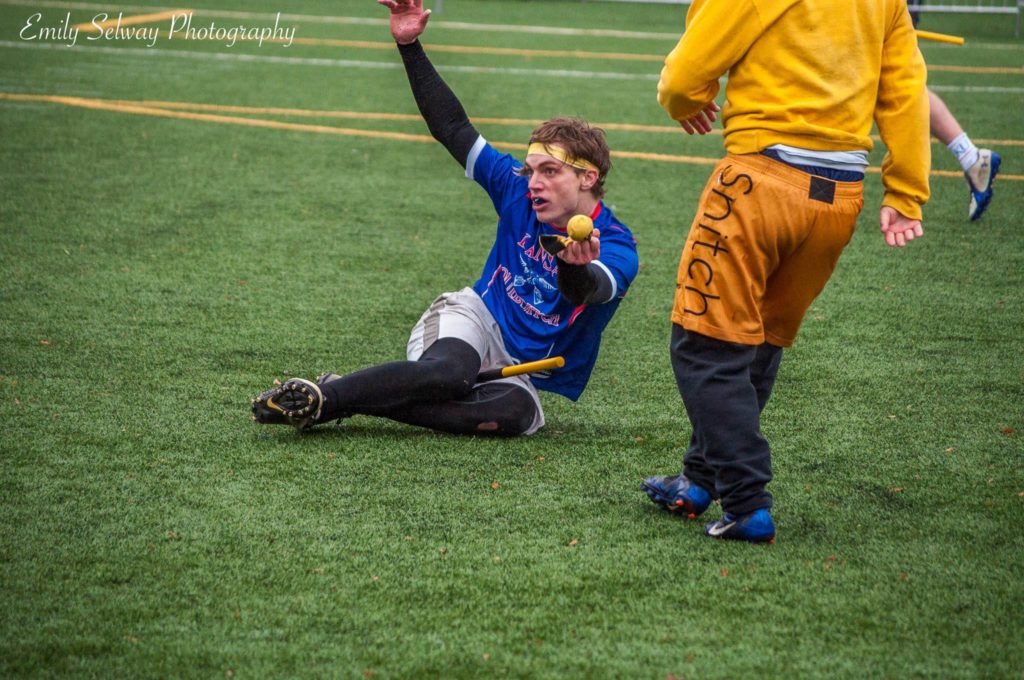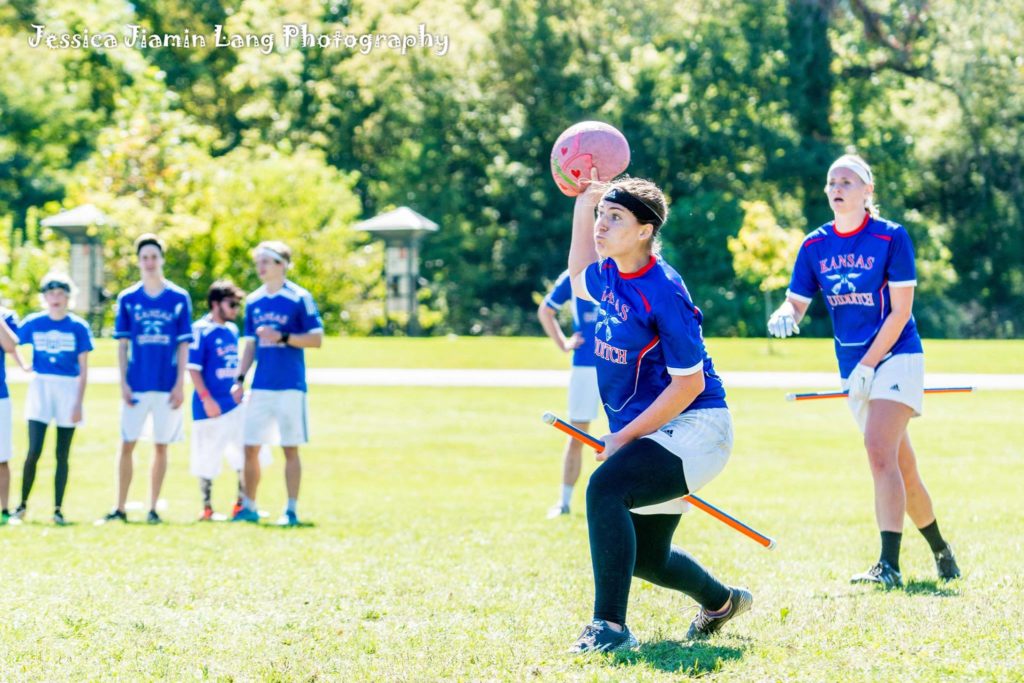Antwerp QC, Much of Belgian Core, Leaves Competitive Quidditch

Credit: Emily Selway
In addition to our preseason rankings, The Eighth Man staff will be releasing a series of articles focusing on the top 10 club teams and top 10 collegiate teams. Each article will be written by two members of the staff, one who believes the team will live up to or exceed expectations and one who thinks they will come up short.

A SWIM-mingly Inconvenient Regression
By Ethan Sturm, Managing Editor
It would be easy to rest on one’s laurels when ranking the University of Kansas for the coming season. This is a team returning most of their key players—including USNT’s Rachel Heald—from a run this past season that included a Midwest Regional Championship title, a Final Four run at nationals and the No. 4 spot in our postseason rankings. If anything, being our preseason No. 3 could be looked at as underrating for a team that you would think has all the pieces to replicate its performance a year ago.
But that idea massively understates just how difficult the Jayhawks’s 2017-18 season would be to replicate. After a fall schedule against a slate of underwhelming teams—during which they lost to Twin Cities Q.C. out-of-range twice and were kept in range by the University of Minnesota thrice—they met the University of Missouri for an easily pre-ordained Midwest Regional Championship final. There, Mizzou let them crawl back into a game they were out-of-range in before catching the snitch twice to win in overtime. In the spring, they traveled down south to be put out-of-range by Texas State University and kept in-range by Baylor University, then showed up to nationals and played just about every team with a pulse in-range, including Central Michigan University, Arizona State University and UCLA before finally falling on a snitch grab to the University of Rochester.
Overall, Kansas went 13-2 in SWIM situations on the year, narrowly avoiding upsets to numerous teams that would never sniff the top 10. Compare this to a fellow contender like Texas State, who played just 10 snitch-range games all season, nine of which featured opposition that finished the season ranked in our final top 10.
Now, you might be thinking that a win is a win, but that level of SWIM success—an 87 percent win rate—is completely unsustainable in quidditch. There is simply too large of a degree of randomness in the snitch game for a team to continue to convert at that level. Take the 2015-16 Ball State University team, which made a Final Four run on the back of USNT-bound seeker Jason Bowling and compiled a 13-6 record in SWIM situations. A year later, with the same seeker, the team went just 7-8 in those scenarios and exited in the first round of bracket play.
Of course, you could make the opposite argument, that a talented team with another year of experience will simply limit the number of games that lesser teams keep them in range. But this is not a team built to blow other squads out of the water. The Jayhawks lack a truly elite scorer, and instead rely on patient build-up play to create openings in a defense. Unfortunately, patient build-up play means limited possession, and limited possessions means closer games and higher degrees of randomness in scorelines. And unless they can magically develop a top-tier scorer or completely change their offensive style, we should expect more of the same.
The randomness of snitch play can always swing either way. But probability tells us that results like to tend towards the mean. Kansas was a snitch grab away from overtime in the Round of 32 and from elimination in the Sweet 16 and quarterfinals. Any of those catches going the other way completely rewrites the story of the Jayhawks’ season. And this year, that may be the kind of stories we’ll be telling.

Credit: Jessica Jiamin Lang

Jayhawks To Soar Over Competition
By Raghuveer Achukola, Correspondent
Kansas made it to the semifinals of USQ Cup 11, losing on a snitch catch to the eventual champion University of Rochester. From that team, this year’s Jayhawks only lose four players. That alone is more than enough to justify Kansas’ spot in our rankings, but let’s go even further and say that this Kansas team will exceed expectations and be in a position to win USQ Cup 12.
Last year, the Jayhawks were plagued by their inability to dominate their opponents, playing 13 in-range games last season—the fifth highest total among all college teams. This proved to be of little detriment. Seeker Bryan Weary came in clutch when working in tandem with beater Ryley Andrews. The duo played incredibly during snitch on pitch last season and led Kansas to a 13-2 SWIM record—the second-best record out of all national qualifying teams last season. Their only snitch-range losses came at nationals to Texas State University and Rochester—teams ranked No. 3 and No. 5, respectively, in SWIM last season.
The loss of Andrews is tough, but it will be mitigated by Weary’s return. Weary attacks the snitch with a powerful dive move that is incredibly difficult to defend for experienced and new snitches alike. His style of attack ends a game not only reliably but also quickly, and he is the main reason that Kansas took only 93 seconds on average to catch the snitch in their in-range wins last season—the quickest time out of all the teams that played more than five in-range games.
Despite their impressive seeking, a possible red flag could be simply the number of in-range games the Jayhawks played last season. No team that has played more than three in-range games at nationals has ever had a perfect record in that tournament. But, in this case, the point may be moot.
With 17 players returning from their 2018 nationals roster, Kansas will easily be able to win more of their games out of range. This team was very close to doing so at USQ Cup 11, holding 30-point leads against Texas State, UCLA and Central Michigan University before inexperience or lack of coordination kept them from taking each of those games out of range. That won’t be the case this year.
Kansas returners include the scariest quaffle rotation in the college division. With USNT’s Rachel Heald at keeper, the Jayhawks will rely on the rotation of chasers Brandon Tabor, Ian McCabe, Ben Engels and Mike Devine to generate scoring drives and big stops on defense. These players, though relatively unknown, are all dangerous weapons for the Jayhawks’s offense. Tabor is a nightmare matchup for any wing defender. His physicality allows him to outmuscle defenders to catch the quaffle in tight spaces. The ability of Kansas’s chasers to consistently find Tabor and have the confidence to pass directly to him in a crowded space played a huge role in their success at USQ Cup 11, scoring three goals in their match against Texas State solely with this one strategy. Kansas’s precision passing and off-ball movement mean that the Jayhawks are able to score without needing to dominate the beater game, easing the pressure off of their beaters.
On defense, McCabe and Tabor are fundamentally-solid point chasers, able to make tackles on opponents of any size and—combined with Engels—lead to a front that was able to stop fast breaks from both Texas State and Arizona State University during USQ Cup 11.
But perhaps the true strengths of this Kansas team are its flexibility and teamwork. With Heald at keeper and Rachel England at beater, this Kansas team can run various lines to counteract whatever opponents throw at them. If Kansas needs physicality around the wing, they can play various lines to counteract whatever opponents throw at them; they can play Heald and England and run with their physical chaser rotation of Tabor, McCabe and Engels. If Kansas needs more explosive snitch-on-pitch beating, they can keep Heald at keeper and use chaser Anna Holmes and a two male-beater set of Jake Simon and Adam McMorris— a set that kept up with Arizona State’s vaunted beater corps during USQ Cup 11. Even if Heald subs out, the Jayhawks have capable returning quaffle players in a second line of keeper Ryan Dickey and chasers Paris Nichols, Mike Devine and Olivia Federico.
While other colleges are taking heavy losses, this Kansas team right now is essentially the same Kansas squad that showed up at USQ Cup 11. With a USNT keeper, a deep rotation of physical and coordinated chasers, solid beating and perhaps the most dangerous seeking threat remaining in college quidditch, Kansas should be considered as the current favorites for the title.
Archives by Month:
- May 2023
- April 2023
- April 2022
- January 2021
- October 2020
- September 2020
- July 2020
- May 2020
- April 2020
- March 2020
- February 2020
- January 2020
- December 2019
- November 2019
- October 2019
- August 2019
- April 2019
- March 2019
- February 2019
- January 2019
- November 2018
- October 2018
- September 2018
- August 2018
- July 2018
- June 2018
- April 2018
- March 2018
- February 2018
- January 2018
- November 2017
- October 2017
- July 2017
- June 2017
- May 2017
- April 2017
- March 2017
- February 2017
- January 2017
- December 2016
- November 2016
- October 2016
- September 2016
- August 2016
- July 2016
- June 2016
- May 2016
- April 2016
- March 2016
- February 2016
- January 2016
- December 2015
- November 2015
- October 2015
- September 2015
- August 2015
- July 2015
- June 2015
- May 2015
- April 2015
- March 2015
- February 2015
- January 2015
- December 2014
- November 2014
- October 2014
- September 2014
- August 2014
- July 2014
- May 2014
- April 2014
- March 2014
- February 2014
- January 2014
- November 2013
- October 2013
- September 2013
- August 2013
- July 2013
- June 2013
- May 2013
- April 2013
- March 2013
- February 2013
- January 2013
- December 2012
- November 2012
- October 2012
Archives by Subject:
- Categories
- Awards
- College/Community Split
- Column
- Community Teams
- Countdown to Columbia
- DIY
- Drills
- Elo Rankings
- Fantasy Fantasy Tournaments
- Game & Tournament Reports
- General
- History Of
- International
- IQA World Cup
- Major League Quidditch
- March Madness
- Matches of the Decade
- Monday Water Cooler
- News
- Positional Strategy
- Press Release
- Profiles
- Quidditch Australia
- Rankings Wrap-Up
- Referees
- Rock Hill Roll Call
- Rules and Policy
- Statistic
- Strategy
- Team Management
- Team USA
- The Pitch
- The Quidditch Lens
- Top 10 College
- Top 10 Community
- Top 20
- Uncategorized
- US Quarantine Cup
- US Quidditch Cup
